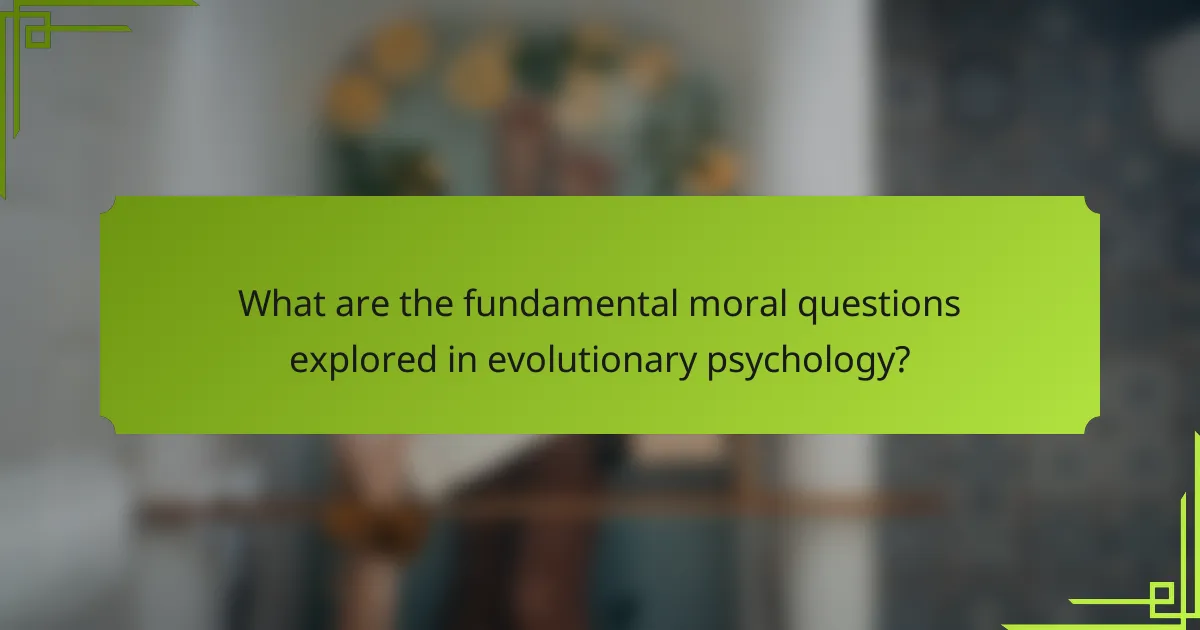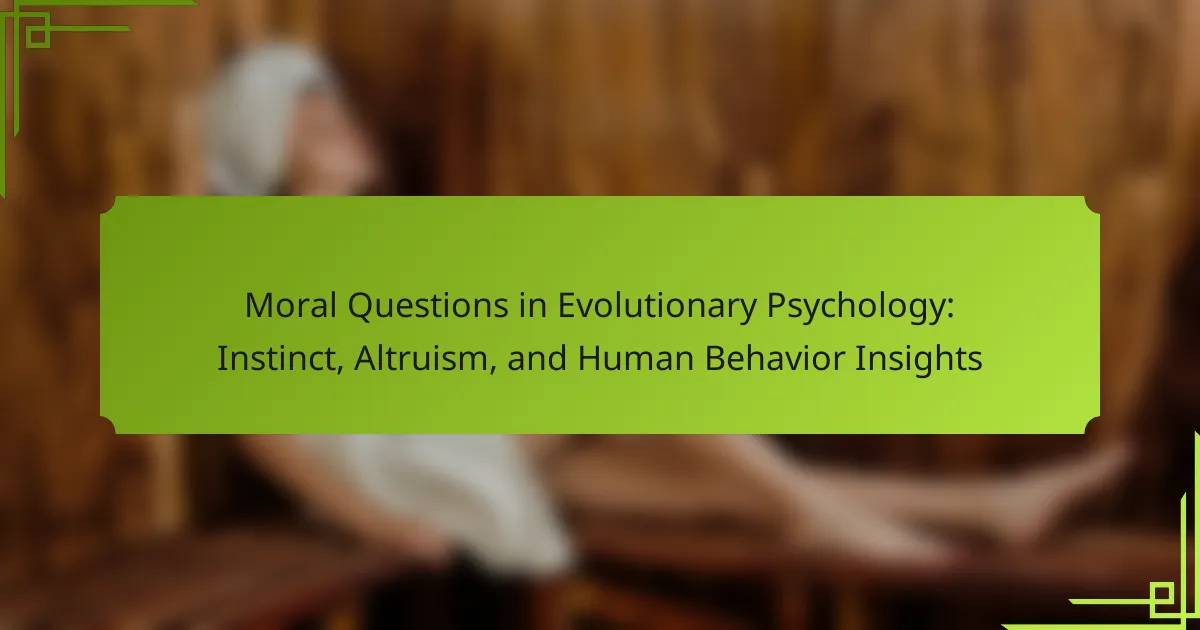Moral questions in evolutionary psychology delve into how instinct and altruism influence human behavior. This field examines whether moral instincts are innate or learned, explores the evolution of fairness and cooperation, and investigates the motivations behind altruistic actions. Additionally, it considers the interaction between genetic factors and cultural influences on moral values across societies.

What are the fundamental moral questions explored in evolutionary psychology?
Evolutionary psychology explores fundamental moral questions related to instinct, altruism, and human behavior. It examines how evolutionary processes shape moral reasoning and ethical behavior. One key question is whether moral instincts are innate or learned. Research suggests that certain moral intuitions, like fairness and cooperation, may have evolved to enhance group survival. Another significant aspect is the role of altruism; understanding why individuals engage in selfless behavior can reveal insights into human nature. Additionally, the interplay between genetic predispositions and cultural influences shapes moral frameworks, raising questions about the universality of moral values across different societies.
How do instinct and morality intersect in human behavior?
Instinct and morality intersect in human behavior through the evolution of altruism and social cooperation. Instincts drive survival and reproduction, while moral frameworks guide social interactions. Altruistic behaviors, often rooted in instinct, enhance group cohesion and individual survival. Research shows that moral instincts evolved to promote trust and cooperation, essential for thriving communities. This interplay shapes complex human behaviors and societal norms.
What role does altruism play in evolutionary psychology?
Altruism plays a crucial role in evolutionary psychology by promoting cooperative behavior that enhances group survival. This behavior fosters social bonds, which can lead to increased reproductive success. Altruistic acts, such as sharing resources, can strengthen community ties and ensure mutual aid during challenging times. Research indicates that altruism may have evolved as a strategy to improve the chances of survival for both individuals and their kin. This suggests that altruism is not merely a moral choice but a fundamental aspect of human behavior shaped by evolutionary pressures.
What are the different forms of altruism observed in humans?
Altruism in humans manifests in several distinct forms, including kin altruism, reciprocal altruism, and collective altruism. Kin altruism involves selfless behavior directed toward family members, enhancing the survival of shared genes. Reciprocal altruism is characterized by exchanges where individuals help others with the expectation of future help. Collective altruism occurs within groups, promoting cooperation for mutual benefit, often seen in community or societal contexts. Each form reflects different evolutionary strategies, emphasizing the complexity of human social behavior.
How does kin selection influence altruistic behavior?
Kin selection significantly influences altruistic behavior by promoting actions that benefit relatives, enhancing their survival and reproductive success. This evolutionary strategy ensures that shared genetic material is passed on, increasing overall fitness. For example, individuals might sacrifice personal gain to help siblings or offspring, as these actions ultimately support the continuation of shared genes within a family unit. Research indicates that kin selection can explain various altruistic behaviors observed in social animals, reinforcing the idea that genetic relatedness drives altruism in many species.
What universal attributes define moral behavior across cultures?
Moral behavior across cultures is defined by universal attributes such as empathy, fairness, and social cooperation. These attributes promote group cohesion and enhance survival. Research indicates that empathy fosters altruistic actions, while fairness principles guide equitable treatment. Social cooperation is essential for resource sharing and conflict resolution, reinforcing community bonds.
How do unique cultural perspectives shape moral reasoning?
Unique cultural perspectives significantly influence moral reasoning by shaping values, norms, and ethical frameworks. Different cultures prioritize various attributes, such as community welfare or individual rights, impacting moral judgments. For instance, collectivist societies often emphasize altruism and group harmony, while individualistic cultures may focus on personal freedom and responsibility. This variation leads to diverse interpretations of moral dilemmas, highlighting the role of cultural context in ethical decision-making. Understanding these differences enhances empathy and global cooperation in addressing moral questions.
What rare moral dilemmas challenge our understanding of human behavior?
Moral dilemmas challenge our understanding of human behavior by exposing conflicts between instinct and altruism. Rare scenarios, such as the trolley problem, reveal how evolutionary psychology influences moral decision-making. These dilemmas highlight the tension between self-preservation and the welfare of others, prompting deeper insights into human nature. Understanding these challenges can reshape our perception of morality and social behavior.
What are some notable case studies illustrating rare moral dilemmas?
Notable case studies illustrating rare moral dilemmas include the Trolley Problem, the Lifeboat Dilemma, and the Heinz Dilemma. These scenarios challenge instinctual responses and altruistic behaviors, revealing insights into human behavior and decision-making processes.
The Trolley Problem presents a choice between saving multiple lives at the expense of one, highlighting the conflict between utilitarianism and deontological ethics. The Lifeboat Dilemma forces individuals to decide who to sacrifice for survival, emphasizing social dynamics and moral reasoning under pressure. The Heinz Dilemma questions the morality of stealing to save a life, showcasing the tension between legal obligations and ethical imperatives.
These case studies exemplify how moral dilemmas can provoke deep reflection on altruism and instinct, revealing the complexities of human behavior in challenging situations.
How does evolutionary psychology explain the development of moral instincts?
Evolutionary psychology explains that moral instincts developed as adaptive behaviors promoting group cohesion and survival. These instincts, such as altruism, enhance cooperative interactions, benefiting both individuals and their communities. Research indicates that moral behaviors are rooted in evolutionary pressures, suggesting a biological basis for ethics. Studies show that individuals with strong moral instincts tend to foster stronger social bonds, which historically improved chances of survival and reproduction.
What insights can evolutionary psychology provide about modern ethical debates?
Evolutionary psychology offers insights into modern ethical debates by highlighting how instinct and altruism shape human behavior. Understanding these influences can clarify moral dilemmas. For instance, the instinct for survival may conflict with altruistic behavior, raising questions about individual versus collective interests. Research indicates that evolutionary mechanisms foster cooperation, suggesting that moral frameworks may be rooted in biological imperatives. This perspective can inform discussions on topics like resource allocation and social justice, revealing the underlying motivations driving ethical choices.
What practical applications can be derived from understanding moral questions in evolutionary psychology?
Understanding moral questions in evolutionary psychology can enhance conflict resolution, improve social cohesion, and inform ethical decision-making. Insights into instinct and altruism reveal how human behavior is shaped by evolutionary pressures. For example, recognizing the evolutionary basis for empathy can lead to better communication strategies in diverse groups. Additionally, applying these insights can foster a deeper understanding of moral dilemmas in various contexts, such as healthcare and environmental policy.
What common mistakes should be avoided when applying evolutionary psychology to moral questions?
To effectively apply evolutionary psychology to moral questions, avoid oversimplifying complex behaviors. Misinterpretations often arise from neglecting cultural influences, assuming universal instincts, or overlooking the role of social context. These mistakes can lead to flawed conclusions about altruism and moral decision-making.
What expert insights can enhance our understanding of morality and human behavior?
Expert insights into morality and human behavior reveal the evolutionary roots of altruism and instinctive responses. Research indicates that moral behavior may stem from survival mechanisms enhancing group cohesion. The interplay between biological predispositions and social learning shapes ethical frameworks. Studies show that empathy and cooperation are vital for societal functioning, suggesting that moral instincts evolved to promote group survival. Understanding these dynamics can deepen our comprehension of moral decision-making processes.
